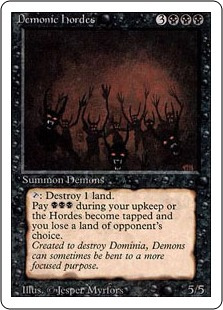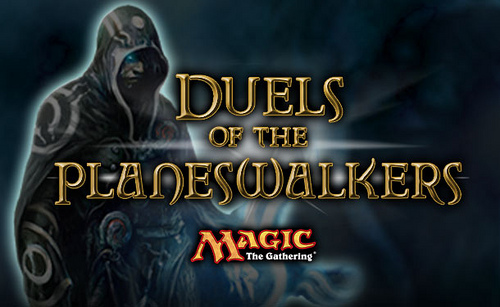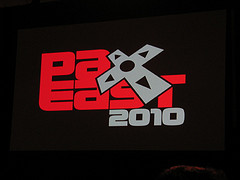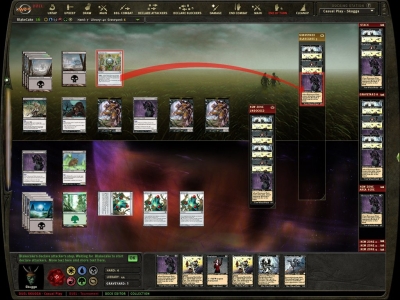This post has not been edited by the GamesBeat staff. Opinions by GamesBeat community writers do not necessarily reflect those of the staff.
Editor's note: I've got my own confession to make here: I was a huge Magic: The Gathering nerd in middle school. Brian's account of his on-again, off-again relationship with the game has me itching to dig my old deck out of my parent's house. -Brett

A long, long time ago, in the ancient time known as 1994, I was but a hideously awkward teenager drowning in the abyss that is high school. I hadn't hit my growth spurt yet, my "look" consisted of a homegrown buzz cut and enormous Coke-bottle glasses, and I was firmly ensconced in the super-nerd subclass of my school's social strata.
Suffice it to say, I wasn't doing too well.
But at the end of my freshman year, a chance encounter at a party suddenly brought me in contact with a huge new group of friends. At first, they just invited me along to their Sunday afternoon pickup games of Ultimate Frisbee, but after a few weeks I started receiving invites to hang out at people's houses afterwards. Hanging out their living rooms, I made the pleasant discovery that my new friends loved games of all kinds.
Instead of spending our post-Ultimate Sundays in front of a TV, gossiping about our classmates, or complaining that there was nothing to do in our plain suburban town, we gathered around dining room tables, sat in circles on the floor, and played whatever games we had on hand.
Often we needed nothing more than a deck of cards. We played round after round of spades, hearts, and gin rummy, along with games that used their own specialized deck of cards, like Phase 10, Rook, and Set. Other times we'd break out a board game like Risk or Settlers of Catan — and this was in the mid-1990s, when the only way to get that game was to import "Die Siedler Von Catan" from Germany and hope that somebody had been able to get their hands on a translation of the instructions!
And, a few months after my new friends brought me into their group, they introduced me to the newest fad to hit the "trad gaming" scene: Magic: The Gathering.
Released in August 1993, Magic brought a new model to competitive card games. Instead of drawing from a collective deck of cards standard to every game, players brought their own decks to the table. Each deck was constructed from a base set of hundreds of different cards, and each card featured its own characteristics, special powers, and contribution to the fantasy-based backstory of the game's universe.
Players could buy more cards from stores in starter decks or booster packs, which packed in rare, powerful cards with weaker common ones. An entire economy soon sprung up around the game. Players traded vigorously with each other, and shops allowed players to build their decks with exactly the cards they needed — as long as they were willing to pay for them!

Thus the "collectible card game" was born, and I quickly got hooked as badly as anyone. Eager to catch up to my friends who had been playing the game for longer than me, I collected cards any way I could think of: accepting donations of hundreds of crap commons by friends who needed to offload their junk, buying pack after pack of boosters, and even paying outrageous prices for the rare, powerful cards I needed to round out my competitive decks.
Eventually, I had built a couple of pretty good decks, but my pride and joy was my mono-black power deck, filled with Nightmares, Dark Rituals, and my favorite, Demonic Hordes.
My friends and I got so into the game that we even played it at school during our lunch period. (While this may have been the equivalent to hanging an enormous neon sign reading "NOT THE COOL TABLE" over our heads, that's not the sort of thing that one cares about when there are far more important matters at hand, like whether to Lightning Bolt your opponent's Grizzly Bears or just burn him for 3 damage directly.)
Even as my friends started picking up new collectible card games like Jyhad or Spellfire, I stuck with Magic through and through — until one fateful night.
Our group had met up at a friend's house for a gaming night, and I brought along my Magic cards as usual. In those days, I carried all of my extra crap in a long card box in case I needed any spares for trading, and my actual decks were carried in a separate, smaller box so as to not mix them up with the rest of the riffraff.
In the middle of a match, I suddenly noticed that it was a half hour before my curfew, and it took me a half hour to get back home! I hurriedly packed up my things, ran out to my car, put my card boxes on the roof, pulled my keys out of my pocket, unlocked the door, grabbed my box of crap, jumped in the car, slammed the door, buckled up, and tore off into the night, beating my curfew by mere seconds.
Astute readers might notice what I didn't realize until the next day: I never grabbed the box with my actual decks off the roof of my car before driving away.
Losing my decks nearly ended my Magic-playing career. My friends were already starting to lose interest in the game, and there was no way I'd be willing to put in the time and money to rebuild my card base, so I stashed my crap box in the basement and didn't think about Magic for nearly 15 years.
That all changed last summer.
See, every now and then when I log onto my 360, I'll scroll through the Spotlight and Game Marketplace channels, just to see if there's anything new in Xbox Live Arcade that I might be interested in. Last June, when booting up my Xbox for yet another session of Fallout 3, I noticed an entry for a new Magic game in the Arcade channel, Duels of the Planeswalkers.

When I discovered that Duels of the Planeswalkers was actually a Magic card game instead of one of the lame action-RPG spin-offs that have come out over the years, I downloaded the trial game and gave it a shot. The mechanics of the game came back to me in a flash, and soon I was casting spells and summoning creatures like I'd never stopped playing.
However, I didn't buy the game right away. I was a little reluctant to give in to Magic's siren song again. Did I really want to get sucked back in to that world, where the quality of your deck was basically equivalent to the amount of money you spent to build it?
"Yeah, but Planeswalkers isn't going to have that problem," I thought to myself after researching the game. "You can't build your own decks and they're only releasing other full decks as DLC, so there's no way to fall into that trap!" Confident in the mental beeswax that I had just stuffed in my ears, I took the plunge and bought the game proper.
After playing through the campaign a couple of times and working my way through the brain-bending puzzle mode, I discovered Planeswalkers' fatal flaw: constructing decks on your own is actually 75% of Magic's appeal — and where most of the fun comes from.
In addition, Planeswalkers' mechanic for unlocking the extra cards for each deck — winning a match with it — quickly becomes rather tedious. And once you've unlocked an extra card, you can only decide whether or not to add it to the untouchable 60-card base deck — meaning that the more you win with a deck, the more bloated it becomes.
So ended my re-dalliance with Magic — until my PAX East badge came in the mail.

As I was perusing the schedule, trying to figure out what I wanted to do, I noticed that Magic would be prominently featured at the convention. Tournaments, leagues, and casual play were scheduled all weekend, and included in everyone's swag bag was a 40-card trial deck in everyone's swag bag. I decided to take the plunge back into Magic for the weekend and see what happened.
I secured a spot in the weekend-long casual league and bought new starter deck and a couple of boosters. Armed with my new cards, I went hunting for games and quickly found them, with my oddly familiar mono-black Vampire deck doing a decent job of holding its own.
I found these Magic games to be a great way to break the ice with fellow convention-goers, and I had friendly conversations with all of my opponents, be they casual pseudo-newbies like me or veteran players who had all of their cards encased in plastic sleeves.
I had only managed to score PAX tickets for Friday and Sunday, so on Saturday afternoon, with my appetite sufficiently whetted, I pulled out my old Box O' Crap and set about making some new decks. With my new cards, I threw together a respectable mono-black deck as well as one of my favorite old decks — an all-or-nothing mono-red burn deck that would either win in five turns or get crushed horribly, but never lacked for drama!
Back at PAX on Sunday, my Magic-playing earned me some new friends, including a pair of brothers who I ended up chatting with for the entire hour-and-a-half wait for the X-Play panel, as well as a very lucky gentleman in the casual league with me — who, at my urging, finally opened the booster he got with his starter pack, only to find Jace, the Mind Sculptor, a "Mythic Rare" card that he immediately sold to the card shop for $30.
After PAX ended, I knew I was hooked again. I had enjoyed getting back into the game way too much to just let the matter drop, but now I faced a decision: Should I play the full-fledged online client, Magic: The Gathering Online (MTGO) or stick with face-to-face contact and real cards?
The online game was a very attractive possibility for me, since there was no way to accidentally lose my collection this time. But I still enjoy face-to-face contact and holding real cards in my hand, so I visited my local card shop to see about getting back into the game. I hoped to sell off some of my old cards to fund this new proposition, but after bringing my 15-year-old collection in and being told that it was completely worthless, I decided to go the online route.

Playing card or board games online, after all, has plenty of advantages: no cards to store, bend, tear, or lose; no shuffling; life totals, counters, tokens and rule resolutions are taken care of automatically; and, for better or worse, you never have to deal with someone being a dick for any longer than necessary.
So I am now the owner of a MTGO account of my very own. For the price of a regular 360 or PS3 game, I bought the $9.99 account fee, a couple of boosters, and plenty of "event tickets," the de facto currency of the online economy which I have used to build up a respectable card base.
I have since rediscovered the art and science of deck construction (my new favorite is a white-blue-black artifact deck built around the ability of the Master Transmuter), the intense strategy of the gameplay, the highs and lows that can only come from a game based on luck, and the friendly people who inhabit MTGO's Casual Decks lounge.
Magic: The Gathering combines the elements of traditional turn-based strategy, the luck and probability analysis of poker, and the far-reaching affects of the Golden Rule of Magic ("When the rules on a card contradict the main rules of Magic, the card takes precedence"). It may be the greatest game ever created. And I, for one, am glad to be back.
